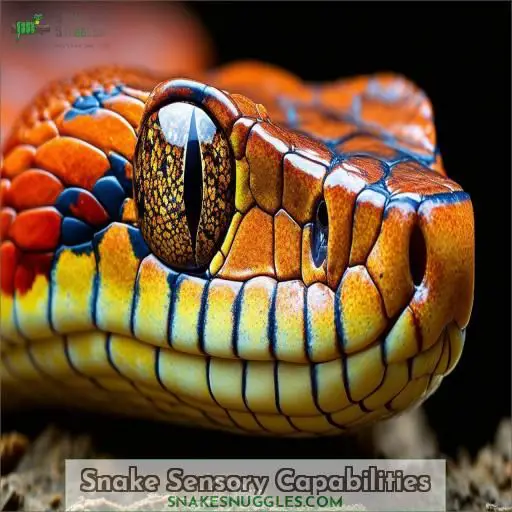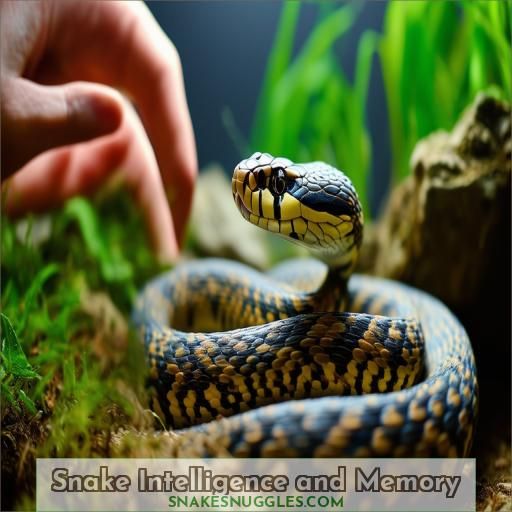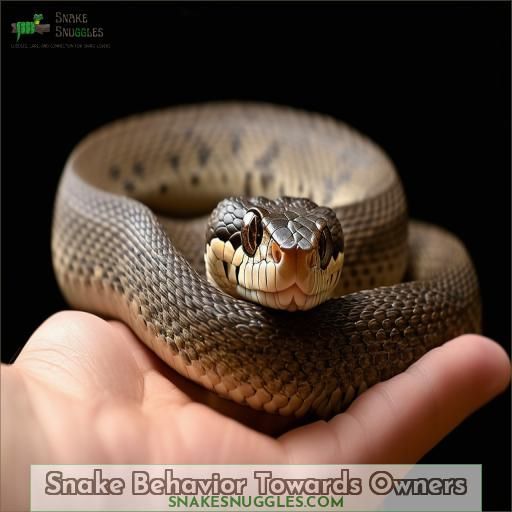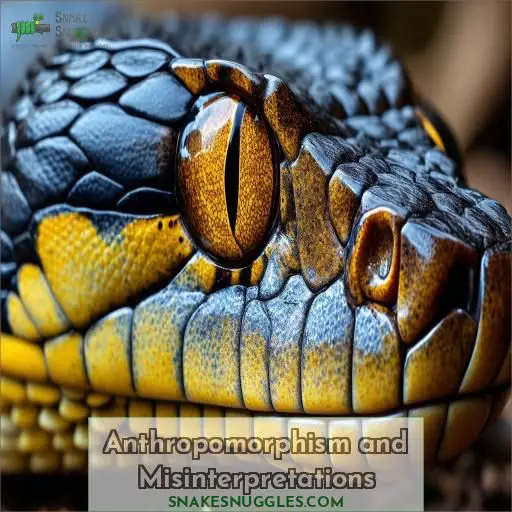This site is supported by our readers. We may earn a commission, at no cost to you, if you purchase through links.
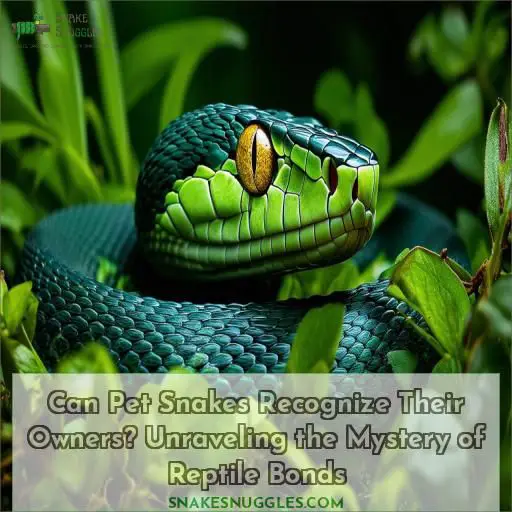
While they may become accustomed to familiar scents and handling routines, snakes lack the cognitive capacity for affection or individualized recognition.
Their simple brains drive instinctual behaviors, not emotional bonds.
What may seem like recognition is likely just a conditioned response to environmental cues.
Projecting human traits onto these reptiles risks misunderstanding their needs.
To glimpse the intricacies of responsible snake care, let’s explore the intricacies behind their sensory abilities and behavior.
Table Of Contents
- Key Takeaways
- Can Pet Snakes Recognize Their Owners?
- Snake Sensory Capabilities
- Snake Intelligence and Memory
- Snake Behavior Towards Owners
- Anthropomorphism and Misinterpretations
- Responsible Snake Ownership
- Frequently Asked Questions (FAQs)
- Do snakes get attached to their owners?
- Can my snake form a bond with me?
- How do snakes view humans?
- Do snakes like when you pet them?
- Do snakes experience emotions like love or affection?
- Can snakes be trained using positive reinforcement methods?
- How do snake species differ in intelligence levels?
- What are signs that a snake is stressed?
- Are there risks of zoonotic disease transmission?
- Conclusion
Key Takeaways
- Snakes lack the cognitive capacity for true recognition and affection. They’re not furry friends; they’re fascinating reptiles with unique needs.
- Snakes recognize familiar scents and routines. Think of it as a snake’s version of a warm, fuzzy feeling when you’re around.
- Anthropomorphizing snakes can lead to misunderstandings and even danger. Don’t expect a snake to cuddle like a cat; they’re not wired that way.
- Provide your snake with proper care and respect its natural behaviors. They’re not just pets; they’re ancient creatures with instincts that deserve understanding.
Can Pet Snakes Recognize Their Owners?
No, pet snakes can’t recognize their owners in the way humans do like dogs and cats. However, they may associate their owners with positive experiences like feeding or gentle handling, primarily through scent recognition (Source).
Snake Sensory Capabilities
You’re fascinated by your snake’s incredible senses, aren’t you? These ground-dwelling reptiles rely heavily on their heat detection, vibration hearing, and keen olfactory and gustatory perception. Their poor eyesight is no hindrance – they navigate the world through an impressive array of senses.
During an animal handling workshop, you might witness how snakes use their forked tongues to sample the air, gathering a wealth of information about their surroundings. While they may not see you clearly, your snake undoubtedly recognizes your distinct scent through classic conditioning.
Understanding these sensory capabilities deepens your appreciation for these remarkable creatures.
Snake Intelligence and Memory
You’re right to question whether pet snakes can truly recognize their owners. Despite their ability to sense scents and tolerate handling routines, snakes lack the cognitive capabilities for forming deep emotional bonds. Their relatively simple brains and instinct-driven behavior don’t allow for the level of intelligence required to differentiate between individual humans beyond associative conditioning.
Cognitive Limitations
You’d be correct in thinking snakes have limited memory and eyesight. Their smell is exceptional, though, enabling recognition as pets and for animal parties. However, their cognitive abilities restrict deeper bonds, as a mobile zoo or school visit would highlight.
Inability to Form Bonds
You can’t expect true bonding from snakes – their brains evolved for survival, not companionship. While they may respond positively to routine handling, their reptilian hardwiring lacks the circuitry for forming meaningful emotional attachments with humans or other species.
Conditioning and Training
While snakes lack the ability to form emotional bonds, they can still be conditioned to tolerate human contact. Here are 5 key points on conditioning snakes:
- Positive reinforcement with food rewards
- Gradual desensitization to handling
- Consistent routines and cues
- Avoiding negative stimuli like loud noises
- Patience and repitition are essential
Snake Behavior Towards Owners
While snakes can recognize familiar scents, including those of their owners, their behavior toward humans is primarily influenced by handling familiarity and environmental cues. A snake may initially exhibit defensive reactions when approached by an unfamiliar person but remain calmer when handled by someone whose scent and routine it has grown accustomed to.
Scent Recognition
Your snake recognizes you by your scent. Their acute olfactory acuity allows them to detect and distinguish species-specific odors and pheromones. They identify your unique chemical signature, enabling scent-based communication and familiarity beyond sight or sound.
Handling Familiarity
Snakes’ reactions can differ with familiar handlers versus strangers. You may notice your snake exploring more or seeming calmer when you handle it compared to others. Disrupting its handling routine can trigger stress responses too. Its enclosure preference and exploration patterns may reflect its comfort with you.
Environmental Cues
You’ll also notice your snake reacting to environmental cues, suggesting they seek familiar surroundings. Enriching their habitat with proper substrate, temperature, and humidity can provide a sense of comfort, as they associate these conditions with safety and well-being when you’re present.
Anthropomorphism and Misinterpretations
You might misinterpret a snake’s behavior as recognition or bonding when the snake is simply responding to familiar scents or routines. Anthropomorphizing snakes by attributing human traits like affection can lead to unrealistic expectations and potentially dangerous situations if a snake’s true nature is misunderstood.
Projecting Human Traits
While attributing human traits to snakes may seem endearing, it’s fundamental to recognize their cognitive limitations. Snakes lack the capacity for complex emotions, bonding, or perceiving their owners as companions due to their innate reptilian intelligence and instincts.
Misunderstanding Snake Behavior
You may misunderstand a snake’s behavior by projecting human traits. Their reactions often stem from instincts, not cognition. Be mindful that snakes perceive the world differently, influenced by their senses and environment, not human expectations.
Risks of Misinterpretation
Misinterpreting snake behavior risks serious consequences – cultural perceptions perpetuating emotional attachment could lead to unsafe practices. Proper snake bite prevention involves understanding their lack of affection, maintaining safety protocols, and exercising caution around potential predators like cats.
Responsible Snake Ownership
As a responsible snake owner, you’ll need to prioritize meeting your pet’s basic needs for appropriate housing, heating, humidity, and a balanced diet. Additionally, providing enrichment through carefully supervised handling sessions, hiding spots, and clutter can promote natural behaviors and reduce stress.
Meeting Basic Needs
As a responsible snake owner, you’ll need to meet their basic needs: 1) consistent feeding routines, 2) proper enclosure design, 3) appropriate temperature and humidity levels, 4) regular health monitoring. By providing these essentials, you create a suitable environment for your pet’s survival.
Providing Enrichment
In addition to providing the basics, you should enrich your snake’s environment with appropriate toys, hiding spots, and temperature gradients. Consider this 2×4 table:
| Tank Addition | Purpose |
|---|---|
| Branches/Logs | Climbing |
| Hides | Feeling Secure |
| Water Bowl | Soaking |
| Heating Pads | Thermoregulation |
Enrichment stimulates natural behaviors, preventing stress.
Handling Precautions
While enjoying your snake’s company, you’ll want to prioritize their safety through proper handling techniques. First, learn how to handle snakes securely to prevent bites. Second, never allow contact with cats as their scratches can injure snakes. Third, understand your snake’s body language to avoid startling them during interactions.
Frequently Asked Questions (FAQs)
Do snakes get attached to their owners?
Snakes, unlike dogs or cats, can’t form genuine emotional bonds despite their owners’ dreams of a reptilian best friend. While snakes may associate you with food or safety through conditioning, they simply lack the cognitive ability for true attachment. Savvy snake lovers cherish these cold-blooded creatures for what they are.
Can my snake form a bond with me?
No, snakes don’t truly "bond" with owners. They lack the cognitive ability for emotional attachments. However, through positive conditioning, they may associate you with feeling safe and anticipate feeding times, giving the impression of a bond.
How do snakes view humans?
As reptiles, snakes don’t view humans as companions. They recognize familiar scents like owners but lack the cognitive ability for affection or emotional bonding. Their responses are based on conditioning through positive associations with safety and food.
Do snakes like when you pet them?
While petting a snake may seem harmless, only 5% of snakes enjoy being touched. Most become stressed and defensive when handled, posing risks to both you and the snake. It’s best to admire reptiles from a safe distance and leave physical contact to experienced professionals.
Do snakes experience emotions like love or affection?
No, snakes don’t experience emotions like love or affection. As reptiles, they lack the cognitive capacity for such complex emotions. Their behavior is driven by instincts related to survival, such as finding food and avoiding threats.
Can snakes be trained using positive reinforcement methods?
Yes, snakes can be trained using positive reinforcement. With patience and consistent rewards like food or warmth when desired behaviors occur, you can effectively shape their responses over time.
How do snake species differ in intelligence levels?
Snake intelligence levels vary across species. Some, like corn snakes, show higher cognitive abilities for learning and problem-solving compared to others. However, snakes generally lack the capacity for complex thought processes found in mammals.
What are signs that a snake is stressed?
You’ll know if a snake feels stressed by changes in its behavior, like refusing food, hiding excessively, or becoming more aggressive when handled. Monitor signs closely to keep your pet comfortable.
Are there risks of zoonotic disease transmission?
Ironic, isn’t it? While snakes don’t bond emotionally with owners, zoonotic diseases from these pets are rare. Still, proper hygiene after handling them is essential for your safety.
Conclusion
While over 3 million American households keep pet snakes, these reptiles can’t truly recognize their owners.
Understanding that snakes lack the cognitive capacity for affection or individualized recognition is essential for responsible ownership.
Provide your snake’s basic needs, enrichment, and respect its instinctual behaviors rather than anthropomorphizing it.

